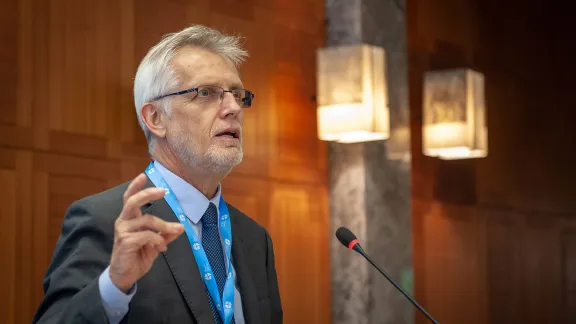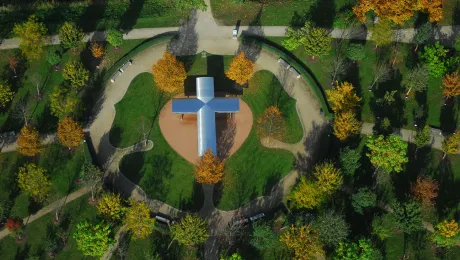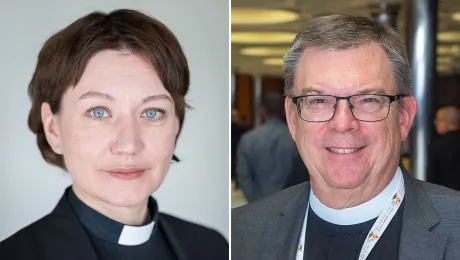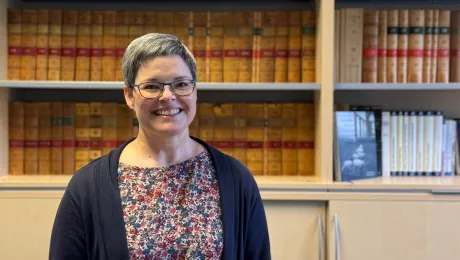
LWF General Secretary Rev. Dr Martin Junge. Photo: LWF/S. Gallay
In his report to Council, the General Secretary says LWF is stable and well-positioned to face post-pandemic period
(LWI) - The Lutheran World Federation (LWF) General Secretary Rev. Dr Martin Junge has highlighted the agility and resilience of the organization in responding to the disruption of the COVID-19 pandemic. The creativity and commitment of staff, he says, alongside the flexibility of churches and funding partners, are a good foundation for its continued witness and service to the world.
In his report to the LWF Council, which is meeting online from 18-23 June, Junge underlines the way the organization reacted swiftly to the outbreak of the pandemic, shifting funding and reprioritizing to serve the communion in a time of crisis. At the same time, he notes, three cycles of Rapid Response Funding were set up and supported the needs of 79 member churches in 52 countries. “Agility,” he says, “is a key word for the LWF’s sustainability” as it continues to articulate “the vision, values, priorities and ways of working,” outlined in its 2019-2024 strategy.
Reflecting on communion relations since the onset of the pandemic, Junge notes the lessons learned through increased online interaction and a ban on international travel. Alongside the financial and ecological consequences of online, rather than in-person meetings, he says, the frequency, reach and scope of virtual activities has allowed for better communication and participation. The task ahead, he stresses, is to take advantage of all the new possibilities “without losing sight of personal encounters.”
LWF member churches “are finding innovative ways to uphold their witness, ministries and institutional processes”
Lamenting the death of church leaders and members of congregations over the past year, Junge speaks of the many other disruptions posed by COVID-19, including pastoral, theological, psychological and economic challenges. Yet, fueled by the Holy Spirit, he says, churches “are finding innovative ways to uphold their witness, ministries and institutional processes.”
Taking an honest look at the theological identity and unity of the LWF, the General Secretary says the communion and its member churches “base this understanding on how our confessional documents define unity.” Difference and disagreement between churches are acceptable, he notes, “as long as the Gospel message of salvation is safeguarded.” The LWF has never existed for itself, he insists, but rather as a witness to God’s ongoing mission in the world. The communion “connects with its deepest calling,” he adds, “when it becomes and expresses God’s gift of reconciliation and justice as received in Christ.”
Reviewing recent developments in ecumenical relations, Junge speaks of the progress and challenges in both bilateral and multilateral dialogues. He notes a forthcoming visit to the Vatican at the end of June with a Council delegation to further dialogue and practical cooperation with the Catholic Church. The LWF, he stresses, has always been and continues to be “a committed actor within the ecumenical movement.”
Holistic mission, service to neighbor
Reviewing innovation and changes in the work to support the presence and witness of member churches, Junge speaks of the four programs of Theology for Transformation, Diakonia, Leadership and Institutional Development, and the new Action for Justice unit which advocates for human rights, climate justice, peace and interfaith harmony and gender justice. He notes the demand for biblical and theological resources to support the gender justice work of member churches, as well as the need to equip churches for holistic mission and to define more clearly the “nature, place and scope of women and youth networks within the communion.”
Reflecting on the work of promoting dignity, justice and peace, he notes that the LWF Department for World Service is the largest faith-based implementing partner of the UNHCR. Service, he insists has been a foundational identity marker of LWF since its inception in 1947. If we lose sight of this, he warns, “we will have lost sight of God’s purpose for the world.” This vocation to serve, he goes on, is the “anchor that keeps us focused on God’s mission” despite competition for funding, ever-increasing compliance demands and complex political challenges in many parts of the world.
Looking ahead to Krakow Assembly
At an organizational level, Junge says, the LWF can boast strong and stable financial management and income development. It is moving to become a globally networked organization, investing in people and communications, while managing cyber security risks and safeguarding institutional memory. Change, Junge continues, must never be an end in itself, but rather for the sake of mission and “our ongoing participation in God’s story in the world.” He outlines ways in which the various departments have accelerated action towards financial stability and stronger engagement with churches at regional level.
Looking ahead to the next Assembly, scheduled for September 2023 in Krakow, Poland, he says the LWF is “stable and well-positioned, vital [and] dynamic” with a “clarity of mission” and an “impressive wealth of resources” to face the uncertainties of a post-pandemic period.
In his last report to the LWF Council before stepping down from the post at the end of October, Junge expresses his “deep gratitude” to the communion, to colleagues, to his family and all who have supported him during his “rich and blessed time serving as General Secretary of the LWF.”
LWF/P. Hitchen
The 18 to 23 June LWF Council meeting will take place online, in view of restrictions imposed because of the COVID-19 pandemic. The LWF Council normally meets in person every year, and is the highest authority of the LWF between assemblies. It consists of the President, the Chairperson of the Finance Committee, and 48 members from LWF member churches in seven regions.


